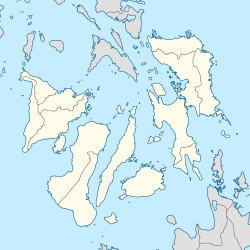History
In its 833rd meeting, the University of the Philippines (UP) Board of Regents established the UP College Tacloban. It was recognized as a regional unit of the System on May 23, 1973 [4] and inaugurated on July 2, 1973.
Ten years later, Executive Order No. 4 placed UP College Tacloban under the administrative supervision of University of the Philippines Visayas.
A new campus will be constructed in Barangay Santa Elena in Tacloban City after the Department of Budget and Management (DBM) approved the funding for the construction of the access road from the national highway to the campus site recently. [5]
On November 8, 2013, the college sustained severe damage and lost one employee and four of its students due to Typhoon Yolanda. [6] Due to the extent of the damage incurred by the college, its students were forced to enroll in other University of the Philippines campuses such as UP Cebu. University of the Philippines Visayas sent cash aid to support UP Tacloban's faculty members a few days after the typhoon hit. [7]
On April 17, 2023, during his opening remarks at the Climate Talks Philippines forum at the UP Tacloban Multi-Purpose Building, UP President Angelo A. Jimenez announced the approval of the Presidential Advisory Council (PAC) to elevate UP Tacloban as an autonomous college of the UP System. In its 1380th meeting, held on 27 April 2023, the UP Board of Regents approved the elevation of UP Tacloban College from being one of the campuses of UP Visayas to an autonomous unit of the University under the Office of the UP President. [8]
This page is based on this
Wikipedia article Text is available under the
CC BY-SA 4.0 license; additional terms may apply.
Images, videos and audio are available under their respective licenses.

